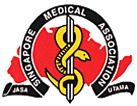
THESMANEWS
Present Issue
Past Issues
Journals
Present Issue
Past Issues
Letters to the Editor

![]()
This site is supported by Health ONE
Doctors as Leaders
The Permanent Secretary (Health), Mr Koh Yong Guan, underlined the importance of professional leadership in healthcare during his address at the NUS Convocation Ceremony on 17th September 1998. This is reported as the lead article in this issue of SMA-News. He stressed the need for leadership to come from all sectors of the medical profession, both from within and outside the Civil Service and announced some policy changes to make this possible.
Paradigm shift
When the topic of improvement is raised, most doctors will tend to think about improving their own medical expertise and that of the staff within their own units. There is a need for a paradigm shift to look beyond the traditional boundaries of medicine into issues concerning the delivery of healthcare services, funding and variation of care. To what extent is the medical profession meeting the needs of the people it seeks to serve?
Teamwork
Leadership also requires teamwork. Mr Koh emphasized the need for professional teams versus individuals and urged doctors to "look beyond their institutional and sectoral walls and see themselves as part of the larger health care system of Singapore."
For teamwork to thrive, there must be an efficient flow of information. The recent publication "State Health ‘97, The Report of the Director of Medical Services (DMS)", is a step in the right direction. In the foreword to this publication, the Director of Medical Services, Dr Chen Ai Ju emphasised that the Report contains within one cover, "for the first time all the relevant health information for the country.... It also provides information on the ministry’s efforts in upgrading the standards of healthcare through quality assurance measures, medical research, setting of guidelines on professional and ethical standards, and the co-operative efforts with international agencies." The SMA will be highlighting the contents of this publication in the coming issues.
Improvement of healthcare delivery system
The subject of doctors as leaders also made its appearance as the theme of a recent series of papers in the Annals of Internal Medicine. One issue raised in this series is leadership in the improvement of the healthcare delivery system. The reference point in the papers is USA.
Can we achieve a common aim of good outcome for patients at a cost that society can afford? The co-authors of one of the papers(l), Donald Berwick and Thomas asked. They noted that the medical profession can greatly improve care by closing the wide gaps which often occur between prevailing practices and the best known approaches to care, and by inventing new forms of care. They also noted that to improve, changes will be needed.
The first change is in the aims of the medical profession. The professional leadership of improvement must begin with a clear acknowledgement of the need for improvement. In the context of health care delivery, if doctors believe that the seeds of fundamental improvement in the system lie within their reach, they can best exert their influence by recognising the problems to be solved and then do everything in their power to assure the solutions they have developed are technically proper, ethically sound and effective.
Characteristics of leaders
In another paper in the series, James Reinertsen(2) described the characteristics of leaders in the improvement of health care. His views are:
• Leaders must embody the values of those whom they lead
• Leaders make needed changes, managers make processes more reliable and predictable and, both roles are important
• Leaders work on the system and at the boundaries of the system; those they lead work in the system The cental aim of leaders is to define the aim of the system and to align all persons and processes toward the aim
• Leaders do not necessarily have to make the improvements and changes themselves, but they need to establish an environment in which improvement can thrive.
Innate or acquired
They also noted that leadership is action, not a position and also that leadership skills are not innate traits; rather they can be learned. When all physicians learn and practice such skills, they can substantially improve health care.
Doctors in Singapore must provide the leadership in healthcare at all levels. The mission to ensure that all Singaporeans have access good and affordable healthcare is too important to leave to non-doctor administrators alone.
DR CHEONG PAK YEAN